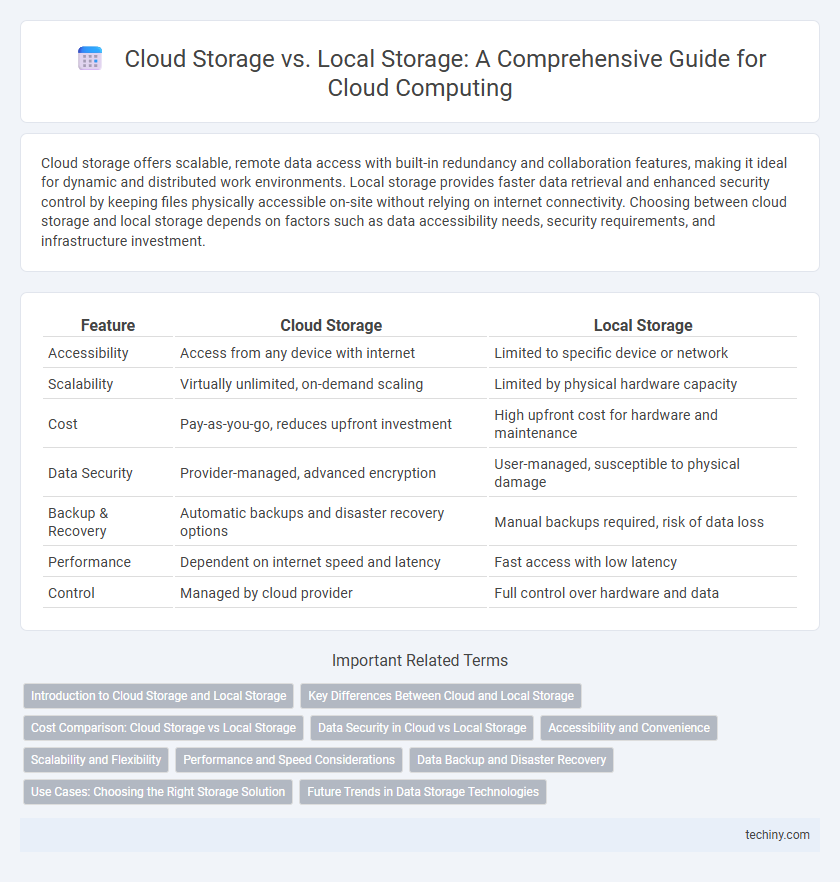Cloud storage offers scalable, remote data access with built-in redundancy and collaboration features, making it ideal for dynamic and distributed work environments. Local storage provides faster data retrieval and enhanced security control by keeping files physically accessible on-site without relying on internet connectivity. Choosing between cloud storage and local storage depends on factors such as data accessibility needs, security requirements, and infrastructure investment.
Table of Comparison
| Feature | Cloud Storage | Local Storage |
|---|---|---|
| Accessibility | Access from any device with internet | Limited to specific device or network |
| Scalability | Virtually unlimited, on-demand scaling | Limited by physical hardware capacity |
| Cost | Pay-as-you-go, reduces upfront investment | High upfront cost for hardware and maintenance |
| Data Security | Provider-managed, advanced encryption | User-managed, susceptible to physical damage |
| Backup & Recovery | Automatic backups and disaster recovery options | Manual backups required, risk of data loss |
| Performance | Dependent on internet speed and latency | Fast access with low latency |
| Control | Managed by cloud provider | Full control over hardware and data |
Introduction to Cloud Storage and Local Storage
Cloud storage allows users to save data on remote servers accessed via the internet, providing scalable capacity, automatic backups, and easy file sharing across devices. Local storage refers to data saved on physical devices like hard drives, SSDs, or USB drives, offering faster access speeds and full control without internet dependency. Understanding the trade-offs between cloud and local storage involves evaluating factors such as cost, accessibility, security, and performance requirements.
Key Differences Between Cloud and Local Storage
Cloud storage offers scalable, remote data access through internet-connected servers managed by third-party providers, ensuring automatic backups, enhanced data redundancy, and seamless collaboration capabilities. Local storage relies on physical devices like hard drives or SSDs, providing faster data retrieval speeds and greater control over security but lacks the flexibility and accessibility of cloud solutions. Key differences include scalability, accessibility, data security management, and cost structure, where cloud storage operates on a pay-as-you-go model versus the upfront investment typical for local storage hardware.
Cost Comparison: Cloud Storage vs Local Storage
Cloud storage typically reduces upfront costs by eliminating the need for physical hardware and maintenance, shifting expenses to a scalable subscription model based on usage. Local storage requires significant initial investment in devices and ongoing costs for upgrades, power, and physical security. Over time, cloud storage often proves more cost-effective for businesses with variable data demands, while local storage may benefit those with predictable, static data needs.
Data Security in Cloud vs Local Storage
Cloud storage employs advanced encryption protocols, multi-factor authentication, and continuous monitoring to enhance data security beyond traditional local storage capabilities. Local storage depends heavily on physical security measures and is vulnerable to hardware failures, theft, and limited backup options. Enterprises prioritize cloud solutions for scalable, secure data protection compliant with standards such as ISO 27001, GDPR, and HIPAA, ensuring robust defense against cyber threats.
Accessibility and Convenience
Cloud storage provides unparalleled accessibility by allowing users to access data from any device with internet connectivity, enhancing flexibility for remote work and collaboration. Local storage offers faster data retrieval speeds and operates without internet dependence, making it reliable in offline scenarios. Cloud storage's convenience stems from automatic backups and scalability, while local storage requires manual management and physical maintenance.
Scalability and Flexibility
Cloud storage offers unparalleled scalability by allowing businesses to easily expand or reduce their storage capacity on demand without physical hardware changes. Local storage, limited by fixed physical space, requires costly upgrades for increased capacity, making it less flexible. The elasticity of cloud storage supports dynamic workloads and rapid data growth, optimizing resource utilization and operational efficiency.
Performance and Speed Considerations
Cloud storage offers scalable performance with rapid access to data across distributed networks, leveraging high-bandwidth internet connections for real-time collaboration and dynamic scalability. Local storage provides lower latency and faster read/write speeds due to direct hardware access, ideal for applications requiring immediate data processing without network dependency. Performance in cloud storage can be influenced by factors like bandwidth, network stability, and server location, whereas local storage performance depends on disk type (SSD vs HDD) and system architecture.
Data Backup and Disaster Recovery
Cloud storage offers scalable, automated data backup solutions with geographic redundancy, ensuring high availability and rapid disaster recovery compared to local storage. Local storage relies on physical hardware, making data recovery vulnerable to hardware failure, theft, or natural disasters without offsite replication. Implementing cloud storage enhances business continuity by providing real-time data synchronization and streamlined recovery point objectives (RPOs) and recovery time objectives (RTOs).
Use Cases: Choosing the Right Storage Solution
Cloud storage is ideal for businesses requiring scalable, remote access and data sharing across multiple devices or locations, such as collaboration platforms and backup solutions. Local storage suits situations demanding high-speed data retrieval, offline access, or sensitive information control, often used in media editing or secure environments. Evaluating factors like accessibility, security, cost, and compliance ensures selecting the optimal storage solution for specific use cases.
Future Trends in Data Storage Technologies
Cloud storage technology is rapidly advancing with innovations in scalable, secure, and cost-effective solutions, outpacing local storage limitations in capacity and accessibility. Emerging trends like edge computing and AI-driven data management optimize cloud storage efficiency and responsiveness, addressing latency and bandwidth challenges. Hybrid storage models combining cloud and local resources are gaining traction, enabling flexible data handling and enhanced disaster recovery strategies for future data infrastructure.
Cloud Storage vs Local Storage Infographic

 techiny.com
techiny.com